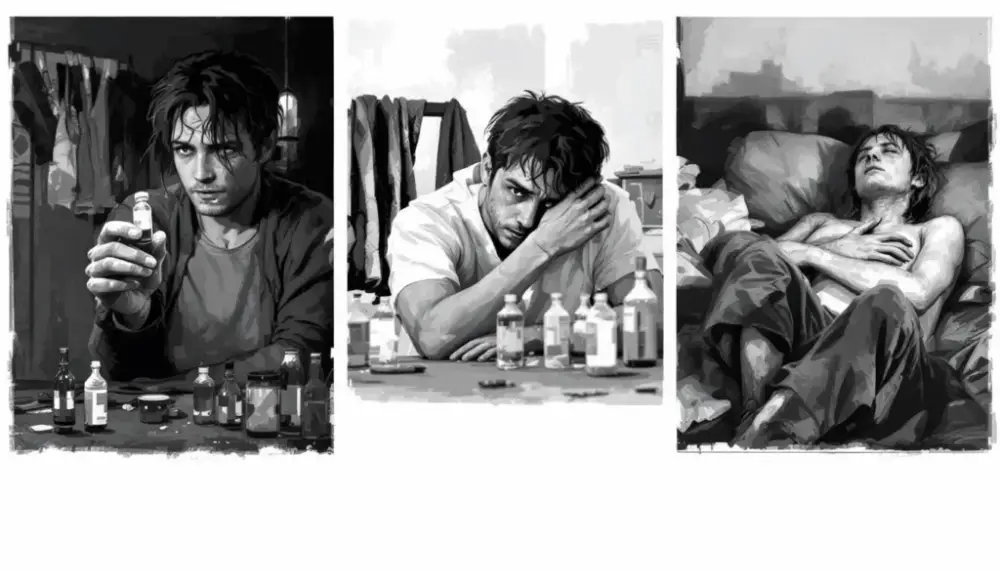
Drug Addiction Cause and Effect: Understanding the Impact and Path to Recovery
Drug addiction is driven by factors like genetics, mental health, and environmental influences. These causes result in severe effects on health, relationships, and finances. This article dives into the ‘drug addiction cause and effect’ to help you understand its impact and the complexities involved.
Key Takeaways
- Drug addiction is influenced by a combination of genetic, psychological, and environmental factors, highlighting the complexity of its roots.
- The development of drug addiction is a gradual process, often beginning with initial use influenced by social dynamics and mental health issues.
- Effective treatment options require an integrated approach combining detoxification, therapy, and community support to enhance recovery chances.
The Root Causes of Drug Addiction

Drug addiction is characterized by chronic, compulsive substance use despite negative consequences. But what causes someone to begin and continue using drugs? The roots of addiction are often deep and multifaceted, stemming from a combination of genetic, psychological, and environmental factors.
Genetic predisposition plays a significant role in an individual’s likelihood of developing drug addiction. Psychological conditions, including mental health disorders, are also significant contributors. Additionally, environmental influences such as socioeconomic status and family dynamics cannot be overlooked. Each of these elements intertwines, creating a complex foundation upon which addiction can develop.
Genetic Predisposition
Family history of addiction is a significant indicator of an individual’s risk for developing similar problems. These inherited traits can influence how substances interact with the brain, making some individuals more vulnerable to dependency.
Recognizing genetic risk factors is crucial for developing preventative strategies and individualized treatment plans. At Legacy Healing Center, clinicians consider family history and genetic vulnerability as part of each client’s personalized assessment.
Psychological Factors
Mental health disorders, unresolved trauma, and chronic stress often underlie substance use disorders. Conditions such as depression, anxiety, PTSD, and personality disorders increase vulnerability to addiction when left untreated.
Legacy Healing Center specializes in dual-diagnosis treatment, integrating trauma-informed modalities like cognitive behavioral therapy (CBT), dialectical behavior therapy (DBT), and Eye Movement Desensitization and Reprocessing (EMDR) to address both the emotional and neurological roots of addiction.
Environmental Influences
Community norms, peer dynamics, family instability, and access to substances all shape the risk of addiction. Early exposure to drug use, prescription medications, or environments that normalize substance misuse can have a lasting impact.
Legacy’s clinical team recognizes the role of environmental trauma and works with clients to identify triggers, build resilience, and establish supportive routines and community networks.
How Drug Addiction Develops

Addiction often begins with voluntary use but progresses through physiological changes that impair decision-making and impulse control. Repeated exposure hijacks the brain’s reward system, gradually leading to dependence.
Initial Drug Use
Common reasons for initial drug use include:
- The desire to escape or mask pain, often linked to mental health issues
- Lack of healthy stress management skills, leading some to experiment with drugs
- Low self-esteem and poor coping mechanisms, which push individuals towards substance use
Initial drug use often occurs in social situations where experimentation is common, with cannabis being a frequently tried substance. The initial decision to use drugs is typically voluntary, but this can be influenced by peer pressure and social dynamics. Individuals who start using drugs at a younger age are at a higher risk of developing more serious addiction problems.
Often, initial drug use is triggered by prescription medications, which can lead individuals to misuse alcohol and escalate their use.
Brain’s Reward System
Repeated drug usage alters dopamine activity in the brain, affecting pleasure and leading to compulsive drug-seeking behavior. These brain changes can lead to lasting addiction with the same effect.
Substance dependency or addiction is one potential outcome of compulsive drug use. Changes in nerve cells (neurons) communication can persist long after stopping cocaine use disorder.
Physical and Psychological Dependence
As addiction progresses, individuals often use drugs primarily to alleviate withdrawal symptoms rather than for recreational purposes. Drug addiction involves a complex interplay of physical and psychological dependence, where the body requires the drug to function normally. This reliance on drugs creates a cycle that makes it increasingly difficult for individuals to quit and maintain sobriety.
The Effects of Drug Addiction on Health

The effects of drug addiction on health are wide-ranging and severe. Drug addiction has a detrimental effect on overall health and can lead to harmful consequences. It also harms relationships and overall well-being. Complications arising from drug abuse can lead to serious health issues and dangerous conditions.
Long-term drug use can lead to severe physical health problems, including:
- Liver disease
- Respiratory complications
- Cardiovascular conditions
- Weakened immune function
- Neurological damage
- Various cancers
- Specific substances, such as methamphetamine or inhalants, can also result in dental deterioration, brain cell damage, and seizures.
Physical Health Issues
Common health problems caused by drug abuse include liver damage, cardiovascular issues, and respiratory problems, as well as other preventable health condition. Substance abuse compromises the immune system, making individuals more susceptible to infections.
Inhalants can irreparably damage nerve cells in the brain and nervous system, while drug use can lead to significant changes in weight and frequent nosebleeds as seen in cocaine users. Drug addiction leads to detrimental physical health effects that can be both severe and life-threatening.
Mental Health Problems
Substance abuse can worsen pre-existing mental health disorders like anxiety and depression, and individuals may develop a use disorder. Severe substance addiction often results in toxic relationships, with many individuals experiencing emotional and psychological harm due to dependence on substances, including alcohol abuse and mental disorders, leading to adverse consequences for their physical and mental health and mental health disorder.
Addiction can lead to a breakdown of trust and communication within families, resulting in significant emotional distress. Addicts may experience heightened anxiety and paranoia, affecting their emotional well-being.
Legacy Healing Center provides integrated psychiatric support through licensed clinicians and medical leadership from experts like Dr. Ash Bhatt.
Behavioral Changes
Drug addiction often leads individuals to engage in risky behaviors, such as driving under the influence, unprotected sex, and criminal activities to obtain substances. These risky behaviors can further exacerbate the cycle of addiction as individuals prioritize substance use over their health and safety.
Individuals struggling with drug addiction may face legal problems, including arrests or charges related to drug possession, trafficking, or other criminal activities. Addiction can lead to social isolation as individuals withdraw from family, friends, and social engagements, prioritizing drug use above relationships.
At Legacy, therapeutic interventions aim to restore emotional regulation and reestablish healthy interpersonal skills.
Social and Economic Consequences of Drug Addiction

The social and economic consequences of drug addiction are profound. Factors that significantly contribute to substance abuse include:
- Peer pressure
- Societal norms
- Cultural attitudes
- Family
- Friends
- Socioeconomic status
- Experiences of abuse, which can further increase the likelihood of addiction.
The environment influences drug abuse through family dynamics, socioeconomic status, and drug availability. Life-changing complications arise directly related to drug dependence, impacting both individuals and societal structures.
Impact on Relationships
Drug addiction can have a profound impact on those close to you. This includes friends, family members, and children. Addiction can lead to social withdrawal and difficulty in maintaining relationships. Individuals may exhibit sudden changes in social circles or friendships.
Substance use disorder erodes trust, communication, and stability in relationships. Families often experience co-dependency, boundary breakdowns, and generational trauma.
Legacy Healing Center offers family therapy and weekend programming to rebuild relational health and educate loved ones.
Drug abuse increases the likelihood of engaging in risky sexual abuse behaviors, which can elevate a person’s risk of further harm.
Financial Difficulties
Individuals struggling with severe addiction face a heightened risk of unemployment and financial instability, contributing to a cycle of debt and economic hardship. Overwhelming medical bills and substantial debt due to substance use are common among those struggling with addiction.
Drug addiction creates significant economic burdens for individuals and society as a whole. The combination of job loss, debt, and medical expenses leads to pervasive economic hardship for those affected by addiction.
Legacy’s case management team helps clients and families navigate these stressors with practical planning and aftercare resources.
Legal Problems
Legal problems are a common consequence of drug addiction. Nearly half of incarcerated individuals report using legal or illegal drugs, highlighting the strong link between drug use and criminal offenses. Many individuals arrested for drug-related offenses often face challenges such as incarceration, which can have lasting impacts on their personal and professional lives, especially when considering the role of illicit drugs.
Drug-related legal issues can result in significant penalties, including potential imprisonment, depending on the severity of the offense. These legal complications often exacerbate the struggles faced by those with addiction, creating barriers to recovery and reintegration into society.
Identifying Signs of Drug Addiction
Recognizing the signs of drug addiction early can lead to timely intervention and support. Staying informed about the signs of drug addiction is crucial for friends and family to offer support effectively. Drug abuse significantly affects mental health, leading to complications such as increased anxiety and depression.
Common signs that a teenager may be using drugs include difficulty distinguishing typical mood changes, behavioral changes, and secrecy. Identifying these signs is essential for providing the necessary help and support to those struggling with addiction.
Physical Changes
Observable changes in physical appearance and health can indicate drug abuse. Examples of observable physical changes include significant weight loss, poor hygiene, visible needle marks (also known as “track marks”), and unusual bruising. Recognizing these signs can be critical for intervention and seeking help for those affected by addiction.
Physical changes are often the first indicators that something is wrong, prompting loved ones to take action.
Emotional and Cognitive Symptoms
Emotional instability is a key symptom associated with drug addiction. Cognitive impairments are common among those suffering from drug addiction, affecting decision-making and memory. Individuals with drug addiction often experience mood swings that can fluctuate dramatically.
Therapeutic interventions often include both individual and group therapy sessions to address underlying issues related to addiction.
Behavioral Indicators
Recognizing behavioral changes is critical in identifying potential drug abuse situations. Changes in behavior and actions, such as neglecting responsibilities or withdrawing from social activity, may indicate drug abuse.
Behavioral signs can vary depending on the specific drug being abused, as different substances can lead to distinct patterns of behavior. Being aware of these indicators can help in providing timely support to those in need.
Effective Treatment Options for Drug Addiction

Recovery is not a one-size-fits-all journey. Comprehensive care requires multiple levels of support. Effective treatment for drug addiction often integrates various methods, ensuring that care addresses both psychological and physical aspects. Comprehensive treatment options for drug addiction involve a combination of behavioral therapies, counseling, and medication.
Addressing addiction early can significantly enhance the likelihood of successful recovery. Professional help is essential in overcoming addiction and managing its consequences.
Detoxification Process
Detoxification serves as a critical initial step in addiction treatment, aimed at safely managing withdrawal symptoms. The detoxification process aims to safely manage withdrawal symptoms as the body clears drugs from its system.
Supervision during detoxification is crucial for managing withdrawal symptoms and ensuring safety. During detox, healthcare professionals may administer medications to ease the patient’s withdrawal experience.
While Legacy Healing Center does not provide medical detox at all locations, we coordinate with trusted partners to ensure safe, supervised withdrawal management when needed, if the client is unable to travel to our closest drug and alcohol detox center.
Therapy and Counseling
Therapeutic interventions such as cognitive-behavioral therapy focus on changing negative thought patterns associated with drug use.
Legacy offers evidence-based therapies such as:
- Cognitive Behavioral Therapy (CBT)
- Dialectical Behavior Therapy (DBT)
- EMDR for trauma
- Motivational Interviewing (MI)
Cognitive-behavioral therapy (CBT) and motivational interviewing (MI) are key therapeutic approaches for addressing substance dependence.
Counseling aids individuals in exploring underlying issues contributing to their addiction and helps in formulating personal recovery plans. Behavioral therapies specifically focus on changing drug use behaviors and developing coping strategies.
Clients also engage in expressive therapies, psychoeducation, and peer process groups.
Medication-Assisted Treatment (MAT)
Medication-Assisted Treatment (MAT) involves the use of FDA-approved medicines in combination with counseling and therapies. MAT helps manage cravings and withdrawal symptoms, facilitating the recovery process through addiction medicine. Legacy Healing Center combines medication with behavioral therapy and clinical oversight.
The use of specific medications in MAT can significantly decrease intense cravings and reduce the likelihood of relapse. MAT commonly includes medications that target cravings and support recovery, enhancing the chances of long-term abstinence.
Prevention Strategies
Drug use can be prevented. Additionally, addiction is also preventable. Avoiding taking drugs entirely is the best way to prevent drug addiction. Prevention programs involving families often include:
- Families
- Schools
- Communities
- Media Preventive measures can be effective when tailored to specific age groups.
Effective prevention combines multiple strategies to address drug misuse. Early detection of drug use is crucial for effective intervention.
Education and Awareness
Educational initiatives focusing on drug trends help communities tailor their prevention strategies to current issues. Education programs aim to improve decision-making and refusal skills related to drug use, as highlighted by the National Institute on drug.
Families who engage in open communication about substance use can reduce the risk of addiction. Open communication within families can significantly reduce the risk of drug misuse among youth.
Family Involvement
Family members can play a vital role in preventing drug addiction by fostering open communication and building trust. Effective communication allows family members to express concerns, share experiences, and support each other in addressing drug-related issues.
Monitoring behaviors and being aware of changes can help families identify early signs of potential substance misuse. Participating in support networks can create a non-judgmental environment that encourages families to share struggles and seek help together.
Legacy’s family programming helps loved ones build supportive, sustainable recovery environments.
Community Programs
Legacy partners with organizations and employers to offer workshops, alumni support, and awareness initiatives.
In addition, online platforms often provide 24/7 access to support and information for individuals in crisis. Hotlines can offer immediate advice and emotional support for those struggling with addiction.
Community outreach and support are essential in preventing addiction by providing resources, awareness, and assistance to those in need. Both online resources and hotlines play a crucial role in connecting individuals with opportunities for help, ultimately reducing the risks associated with addiction.
Seeking Help and Support
Acknowledging the need for help is the first step. Whether through self-referral or a professional intervention, the journey begins with connection.
Support is crucial to address challenges and mitigate the impact of drug addiction. Seeking help sooner improves the chances for long-term recovery in addiction. If drug use becomes unmanageable, it is advisable to call an accredited, licensed addiction treatment center. This is particularly important if it starts to create issues in your life.
An intervention can motivate someone struggling with addiction to seek or accept help. It can be facilitated by:
- Family
- Friends
- Health care providers
- Intervention professionals
During an intervention, participants gather for a conversation about the consequences of addiction.
Professional Treatment Centers
There are various types of treatment centers available for drug addiction, including inpatient, outpatient, and residential programs. Each treatment program can vary significantly in structure, duration, and approach, impacting the recovery process.
When choosing a treatment center, it is crucial to consider factors such as the center’s accreditation, staff qualifications, and the types of therapies offered. Selecting the right treatment center is an essential step towards achieving lasting recovery, as it influences the support and resources available during the healing process.
Legacy Healing Center is a nationally accredited provider offering partial hospitalization (PHP), intensive outpatient (IOP), outpatient, and aftercare services. Our trauma-informed approach addresses root causes, not just symptoms.
Support Groups
Support groups like Alcoholics Anonymous (AA) and Narcotics Anonymous (NA) provide a community for individuals recovering from addiction. Joining AA or NA offers members emotional support, accountability, and shared experiences that can help in the recovery journey.
These groups foster a sense of belonging and understanding, which is vital for maintaining sobriety and rebuilding a healthy, drug-free life.
Online Resources
Online resources play a crucial role in helping individuals struggling with drug addiction find support and information. Platforms such as the Substance Abuse and Mental Health Services Administration (SAMHSA) provide valuable information on treatment options, local providers, and support resources.
Online forums and communities, such as Reddit’s r/stopdrinking and similar subreddits, allow individuals to share their experiences and receive support from peers. Hotlines like the National Helpline (1-800-662-HELP) offer immediate assistance to those in crisis or seeking information about addiction treatment.
Accessing these online resources is a vital step for those seeking recovery from drug addiction.
How Our Drug Addiction Treatment Centers Can Help
Drug addiction is a multifaceted issue with deep-seated causes and wide-ranging effects on individuals and society. Genetic predisposition, psychological factors, and environmental influences all play significant roles in the development of addiction. Recognizing the signs of addiction and understanding its impact on health, relationships, and finances is crucial for timely intervention and support.
Effective treatment options, including detoxification, therapy, and medication-assisted treatment, offer hope for recovery. Prevention strategies involving education, family involvement, and community programs are essential in combating the spread of addiction. By seeking help and utilizing available resources, individuals can overcome addiction and rebuild their lives. Together, we can create a supportive environment that fosters recovery and resilience.
Legacy Healing Center combines expert medical care, evidence-based therapy, and compassionate support to help individuals and families heal. If you or someone you love is struggling, we’re here to help. Call 888-534-2295 today or verify your insurance online to learn more about our programs and about our immediate, same-day rehab availability.
Frequently Asked Questions
What are the primary causes of drug addiction?
The primary causes of drug addiction include genetic predisposition, psychological factors, and environmental influences such as family history, mental health disorders, and community attitudes toward drug use. Understanding these factors is crucial for addressing and preventing addiction.
How does initial drug use lead to addiction?
Initial drug use can quickly lead to addiction as repeated use disrupts the brain’s reward system, resulting in physical and psychological dependence. This process is often influenced by external factors such as peer pressure and mental health challenges.
What are the physical health effects of drug addiction?
Drug addiction can severely impact physical health, resulting in liver damage, cardiovascular problems, a compromised immune system, and noticeable changes in weight and appearance. These effects underline the critical need for intervention and support.
How can families help in preventing drug addiction?
Families can prevent drug addiction by fostering open communication, building trust, and actively monitoring behaviors. Engaging in support networks can further strengthen prevention efforts.
What are some effective treatment options for drug addiction?
Effective treatment options for drug addiction consist of detoxification, therapy and counseling, and medication-assisted treatment (MAT), all of which target both psychological and physical aspects of the issue. Consider these methods to promote a comprehensive recovery journey.






 Verify Insurance
Verify Insurance